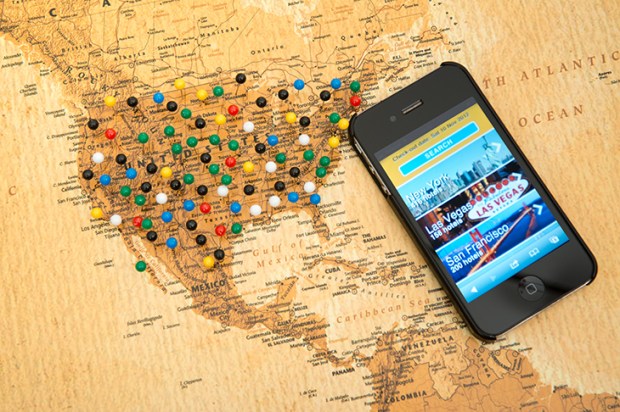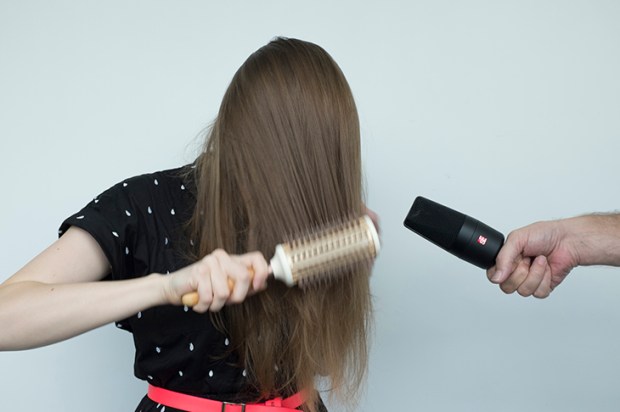When Greg, my old uni pal, came to stay from NYC he brought with him an extra bag for his pills: vitamins A, B, C, D, zinc, magnesium, selenium, ginseng. They decamped to the kitchen, the pills, and stood in rows beside the kettle awaiting their morning ritual. They were bigger than British versions, I noticed, and more violently coloured.
Come breakfast, Greg requested pomegranate juice, not for taste but for antioxidants, and orange juice for electrolytes. Then there was lunch. We’d be nearing the end of a trek round some royal palace when suddenly Greg’s voice would flatten: ‘You know, I think my blood sugar’s getting low?’ Then, in a dangerous monotone: ‘I need to eat.’
At first I didn’t take much notice. Greg isn’t diabetic or thin. This turned out to be a mistake. The lower his ‘blood sugar levels’ dropped, the worse Greg’s mood became, and because it was medical he saw no need to buck up. On we’d plod, past evening dresses once worn by Diana, Princess of Wales, locked in a murderous silence: the very definition of a lose-lose situation.
As Greg’s visit progressed, I learnt to be quicker off the mark. Blood sugar? I’d race us to a restaurant. For anyone expecting an American guest, I recommend an American franchise for lunch. Just as branded ‘Nurofen’ works better (for placebo reasons) than cheapo supermarket replicas, so McDonald’s and Starbucks were most helpful to Greg’s blood sugar. We’d sit in silence as he self-medicated with brownies.
I like Greg, I really do, but over the week I realised that most of the ordinary fluctuations in his everyday life had been redefined as medical issues. A bad night’s sleep? Light sensitivity. Headache? Sugar intolerance. (So why all the brownies, Greg?) Hunger was invariably this joyless ‘need to eat’. Once we attempted a walk up Box Hill, but he sat down after 200 yards all out of puff and blamed a metatarsal. Well, he’s left now, and I’m getting this off my chest in print because Greg did not react well to teasing and because the siren-call of victimhood, the slow medicalisation of everyday life, isn’t just an American problem, but has infected Britain too.
I think it began over here with widespread use of the phrase ‘dietary requirements’. There was a time back in the carefree 20th century when we mocked a dinner guest who claimed to be ‘gluten free’, but it’s quite normal these days — even here at The Spectator. And what about medicalisation of moods? I don’t mean clinical problems: serious depression or schizophrenia — just regular ups and downs: anxiety, feeling dim, shy, blue or off sex for a bit. These days we don’t stick it out — we get a prescription, join an online support forum, make new forum friends, which we’ll need if we carry on like this.
For a measure of how out of hand this has got, take the practice of Buteyko, as recommended by my usually clever colleague James Delingpole. This last Easter weekend, I found a friend of mine, a lovely, funny woman, purple in the face from holding her breath. It’s Mr Buteyko’s cure, she said, and it had cost her a fair bit to learn it. Mr Buteyko, she explained, says we all breathe too much and that many of the world’s worst diseases can be attributed to this. He’s medicalised breathing. It’s a pretty spectacular feat.
Why have we let normal life become a burden? Isn’t genuine sickness, and death, bad enough? We’re the richest, luckiest, most comfortable humans that have ever lived, so why can’t we relax?
There are four possible candidates for blame. There are those who practise what I shall now call the Buteyko method. They claim to cure some common problem, cook up some dubious science and a founder with an inspiring life story. GPs don’t help either. Too often they prescribe harmless pills to patients just to make them go away. They say in their defence that the pills do work — as a placebo. This is no excuse when they’re only making the cultural problem worse.
Then there’s psychiatrists. For them, medicalisation means world domination, so they’re always at it. A few years back, the official handbook for American shrinks tried to define grieving for over two weeks — even after the death of your spouse, or a child — as a disorder to be treated with drugs. Hooray for the medical journal the Lancet, which gave them what for. ‘Grief is not an illness, it is more usefully thought of as part of being human,’ it wrote. ‘Doctors would do better to offer empathy than pills.’
Most often blamed for medicalisation are those regular villains the pharmaceutical giants, for what is called ‘disease mongering’. My favourite example is brought to you by GlaxoSmithKline. In order to extend their patent on Paxil, an antidepressant, GSK invented an ailment for it to cure. They found a brief mention of a little-known nervous condition — Social Anxiety Disorder — in a psychiatric journal somewhere, and hired a PR firm to turn it into a star. The symptoms don’t amount to much more than being shy, but it was marketed with a serious ad campaign and a catchphrase: ‘Imagine being allergic to people.’ Instantly thousands of people decided that were sufferers and the PR company won an award.
So you could blame these four — fads, docs, shrinks or big pharma — but that seems wrong to me. It makes us victims again when, if we’re honest, we do it to ourselves. Instead of seeing the odd dip or disadvantage as normal, we squirrel it off to Google and make it a medical problem. If we do have some bug, we invariably make it worse. We take our paltry symptoms and search through hundreds of explanations until we find the worst possible one — meningitis, a brain tumour — and then diagnose ourselves with that. It’s so common, this phenomenon, that there’s a name for it now: cyberchondria. Not to worry though: someone somewhere, I expect, will sell you a pill for it soon.
Got something to add? Join the discussion and comment below.
Get 10 issues for just $10
Subscribe to The Spectator Australia today for the next 10 magazine issues, plus full online access, for just $10.
Mary Wakefield is deputy editor of The Spectator
You might disagree with half of it, but you’ll enjoy reading all of it. Try your first month for free, then just $2 a week for the remainder of your first year.















Comments
Don't miss out
Join the conversation with other Spectator Australia readers. Subscribe to leave a comment.
SUBSCRIBEAlready a subscriber? Log in